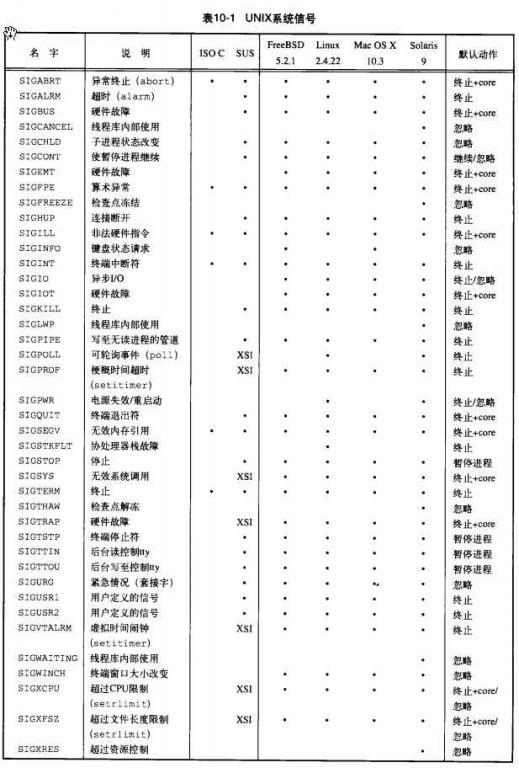< Version 0.1 2011-11-21 Init draft>
传统 Unix系统的信号定义和行为
所有的符合Unix规范(如POSIX)的系统都统一定义了SIGNAL的数量、含义和行为。 作为Linux系统,Android自然不会更改SIGNAL的定义。在Android代码中,signal的定义一般在 signum.h (prebuilt/linux-x86/toolchain/i686-linux-glibc2.7-4.4.3/sysroot/usr/include/bits/signum.h)中:
/* Signals. */
#define SIGHUP 1 /* Hangup (POSIX). */
#define SIGINT 2 /* Interrupt (ANSI). */
#define SIGQUIT 3 /* Quit (POSIX). */
#define SIGILL 4 /* Illegal instruction (ANSI). */
#define SIGTRAP 5 /* Trace trap (POSIX). */
#define SIGABRT 6 /* Abort (ANSI). */
#define SIGIOT 6 /* IOT trap (4.2 BSD). */
#define SIGBUS 7 /* BUS error (4.2 BSD). */
#define SIGFPE 8 /* Floating-point exception (ANSI). */
#define SIGKILL 9 /* Kill, unblockable (POSIX). */
#define SIGUSR1 10 /* User-defined signal 1 (POSIX). */
#define SIGSEGV 11 /* Segmentation violation (ANSI). */
#define SIGUSR2 12 /* User-defined signal 2 (POSIX). */
#define SIGPIPE 13 /* Broken pipe (POSIX). */
#define SIGALRM 14 /* Alarm clock (POSIX). */
#define SIGTERM 15 /* Termination (ANSI). */
#define SIGSTKFLT 16 /* Stack fault. */
#define SIGCLD SIGCHLD /* Same as SIGCHLD (System V). */
#define SIGCHLD 17 /* Child status has changed (POSIX). */
#define SIGCONT 18 /* Continue (POSIX). */
#define SIGSTOP 19 /* Stop, unblockable (POSIX). */
#define SIGTSTP 20 /* Keyboard stop (POSIX). */
#define SIGTTIN 21 /* Background read from tty (POSIX). */
#define SIGTTOU 22 /* Background write to tty (POSIX). */
#define SIGURG 23 /* Urgent condition on socket (4.2 BSD). */
#define SIGXCPU 24 /* CPU limit exceeded (4.2 BSD). */
#define SIGXFSZ 25 /* File size limit exceeded (4.2 BSD). */
#define SIGVTALRM 26 /* Virtual alarm clock (4.2 BSD). */
#define SIGPROF 27 /* Profiling alarm clock (4.2 BSD). */
#define SIGWINCH 28 /* Window size change (4.3 BSD, Sun). */
#define SIGPOLL SIGIO /* Pollable event occurred (System V). */
#define SIGIO 29 /* I/O now possible (4.2 BSD). */
#define SIGPWR 30 /* Power failure restart (System V). */
#define SIGSYS 31 /* Bad system call. */
#define SIGUNUSED 31我们知道,信号处理的方式一般有三种:
1. 忽略 接收到信号后不做任何反应。
2. 自定义 用自定义的信号处理函数来执行特定的动作
3. 默认 接收到信号后按默认得行为处理该信号。 这是多数应用采取的处理方式。
而 传统 UNIX系统对以上信号的默认处理如下图所示 (来自 APUT ):

Android 系统 信号处理的行为
我们知道,信号处理的行为是以进程级的。就是说不同的进程可以分别设置不同的信号处理方式而互不干扰。同一进程中的不同线程虽然可以设置不同的信号屏蔽字,但是却共享相同的信号处理方式 (也就是说 在一个线程里改变信号处理方式,将作用于该进程中的所有线程)。
Android也是Linux系统。所以其信号处理方式不会有本质的改变。但是为了开发和调试的需要,android对一些信号的处理定义了额外的行为。 下面是这些典型的信号在Android系统上的行为:
1. SIGQUIT ( 整型值为 3)
上面的表10-1显示,传统UNIX系统应用,对SIGQUIT信号的默认行为是 "终止








 本文深入探讨了Android系统中的信号处理,包括信号的定义、默认行为和自定义处理。在Android中,信号处理是进程级别的,如SIGQUIT信号,不同于传统Unix的"终止+CORE",它会打印所有线程状态并生成trace文件。Android进程在接收到某些异常信号如SIGILL、SIGABRT等时,会生成tombstone文件。信号可以通过kill、raise等系统调用或adb工具产生。在测试中,发送信号的正确间隔对产生预期行为至关重要,如连续发送SIGSEGV可能导致进程终止并生成tombstone文件。
本文深入探讨了Android系统中的信号处理,包括信号的定义、默认行为和自定义处理。在Android中,信号处理是进程级别的,如SIGQUIT信号,不同于传统Unix的"终止+CORE",它会打印所有线程状态并生成trace文件。Android进程在接收到某些异常信号如SIGILL、SIGABRT等时,会生成tombstone文件。信号可以通过kill、raise等系统调用或adb工具产生。在测试中,发送信号的正确间隔对产生预期行为至关重要,如连续发送SIGSEGV可能导致进程终止并生成tombstone文件。
 最低0.47元/天 解锁文章
最低0.47元/天 解锁文章















 1万+
1万+

 被折叠的 条评论
为什么被折叠?
被折叠的 条评论
为什么被折叠?








